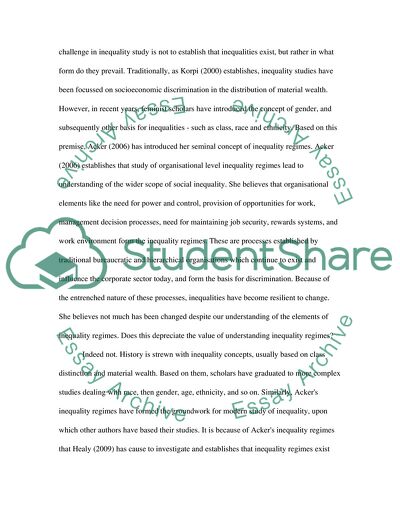
- Home
- Free Samples
- Premium Essays
- Editing Services
- Extra Tools
- Essay Writing Help
- About Us
- Studentshare
- Subjects
- Miscellaneous
- Critically appraise the value of the concept of inequality regimes for understanding workplace inequalities
Critically appraise the value of the concept of inequality regimes for understanding workplace inequalities - Essay Example

- Subject: Miscellaneous
- Type: Essay
- Level: Undergraduate
- Pages: 4 (1000 words)
- Downloads: 0
- Author: qmarvin
Extract of sample "Critically appraise the value of the concept of inequality regimes for understanding workplace inequalities"
Indeed, the dimensions of inequality are numerous, for which understanding of inequality regimes for change purposes becomes important. Such endeavours are especially imperative if inequalities are, as experts establish, resilient due to entrenched values in social systems like work organisations, economic processes and legal systems. In the following study, the researcher shall establish that there is a need for intersectional study of social processes in organisations (and thereby the society at large) which lead to inequality regimes to develop monitoring mechanisms and measures for change.
At the root of social inequality lies economic discrimination, even though today scholars acknowledge inequality can be intangible too (such as power and attitude). The challenge in inequality study is not to establish that inequalities exist, but rather in what form do they prevail. Traditionally, as Korpi (2000) establishes, inequality studies have been focussed on socioeconomic discrimination in the distribution of material wealth. However, in recent years, feminist scholars have introduced the concept of gender, and subsequently other basis for inequalities - such as class, race and ethnicity.
Based on this premise, Acker (2006) has introduced her seminal concept of inequality regimes. Acker (2006) establishes that study of organisational level inequality regimes lead to understanding of the wider scope of social inequality. She believes that organisational elements like the need for power and control, provision of opportunities for work, management decision processes, need for maintaining job security, rewards systems, and work environment form the inequality regimes. These are processes established by traditional bureaucratic and hierarchical organisations which continue to exist and influence the corporate sector today, and form the basis for discrimination.
Because of the entrenched nature of these processes, inequalities have become
...Download file to see next pages Read MoreCHECK THESE SAMPLES OF Critically appraise the value of the concept of inequality regimes for understanding workplace inequalities
The Common Wonders of Garcia Marquez's Recent Fiction
Gender and Value: Inequality in the Workplace Environment and Affirmative Action
Gender and Inequality in the Canadian Workplace
The Notion of Inequality Regimes at Workplace
Gender Inequalities in the Workplace
Human Resource Management in a National Context
Factors that Differentiate the Male and Female Workforce
Evidence of the Association of Legislative Change to Range of Professional Practice in Home Care UK

- TERMS & CONDITIONS
- PRIVACY POLICY
- COOKIES POLICY